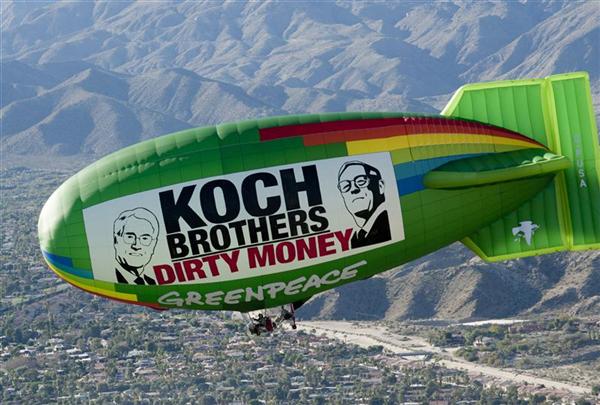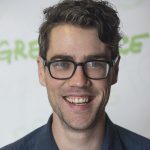David Hamilton Koch has died at age 79. Mr. Koch was one of two primary shareholders of Koch Industries, the privately-owned family company he retired from in 2018, which remains in the control of his brother, Charles G. Koch.
As obituaries and commentary are published across the country, many will overstate David’s role in building the political empire that has ultimately always been overseen by Charles Koch. Greenpeace has worked on Koch-related issues since 2010, and we recommend utilizing the new Koch Docs website for historic source material on David Koch, his 1980 Vice Presidential bid, and other rare references.
There is no doubt that David Koch was actively assisting Charles Koch in advancing his political ambitions — to have a permanent influence network, built around the political system, rather than within it, that could be employed to attack or advance specific political issues no matter who American voters elect to represent them.
The Kochs, and their fortunes, have made this dream a reality, especially following the 2010 midterm elections and the rise of the U.S. “tea party” movement. Koch wealth played a major role in nurturing astroturf groups like Americans for Prosperity, something David Koch initially denied. In fact, the Koch-controlled group that preceded Americans for Prosperity tried and failed to launch a tea party movement in 2002, seven years before the movement took off in 2009.
David Koch was a climate change denier, and he actively financed efforts to rally the public against the scientific community. In 2010, Greenpeace began tracking the money spent by the Koch family on organizations attacking climate scientists, their research, and the policy solutions designed to address the problem. Since 1997, when the world was negotiating the Kyoto Protocol, Koch family foundations poured over $127 million into 92 organizations that have fought against solutions to the climate crisis.
Despite his engineering degree from MIT, Koch’s role of Executive Vice President of one of the world’s largest oil gathering, refining, exploration, and pipeline conglomerates seemed to preclude his understanding of basic climate science. The Intergovernmental Panel on Climate Change (IPCC) Second Assessment report of 1995 cemented a firm consensus among scientists that human fossil fuel use has pushed our climate to unnatural extremes. NASA’s James Hansen already warned Congress eight years before that IPCC report, in 1988, that global warming was already in effect and human industrial activity was responsible.
And yet, over twenty years later, David Koch stubbornly told reporters that that global warming would be good for the planet. He repeated discredited arguments that were debunked by scientists, like the myth that a warmer planet means there will be more food to feed people (overall, agriculture is threatened by an unstable climate and extreme weather). In a rare on-camera interview with Lee Fang in 2011, David Koch repeated the myth that addressing climate change would harm the economy (multiple studies conclude it costs a lot more to do nothing).
More recently, David Koch ignored the findings of a study by Dr. Richard Mueller, financed by Charles Koch, who surprised the world when he reversed his own climate change skepticism and validated the consensus among scientists–global temperatures are rising, the models are accurate, and human activity is responsible.
At an Americans for Prosperity conference in 2011, Greenpeace attempted to ask Mr. Koch about his opinion, following the Koch-funded “Berkeley Earth” study by Dr. Mueller. David Koch did not answer the question, but he got the message. We handed him a “Wanted for Climate Crimes” poster with his and Charles’ faces on it, with the understanding that he had seen the poster before.
But the reality is that David Koch’s passing will not change anything, politically speaking.
It has always been Charles Koch who was the driving force of the “Koch brothers” political network, and the ringleader of Koch Industries, the source of the fortunes that fuels his political activity. From a young age, Charles Koch was chosen by his father, Fred Koch Sr., to essentially be the family heir, in spite of the fact that neither Charles nor David were the eldest of the four Koch brothers.
David was the brother who got along the best with Charles. After Fred Koch’s death, Charles Koch took over the company that is now called Koch Industries. Two of Charles’ three brothers joined him as executives of the company. It was David Koch who stayed with Koch Industries in the decades that followed, as the other two brothers were bought out of the company. It was David who sided with Charles, when his own twin brother, Bill Koch, and eldest brother Frederick Koch, engaged in 20 years of lawsuits against Charles and David, in an attempt to recover more wealth they felt they deserved as co-inheritors of Koch Industries. (This history is the subject of several books and dozens of articles).
While Charles has spent his years in the Koch hometown of Wichita, Kansas, obsessing over the management of his company and his ever-evolving political empire, David Koch spent most of his time in New York City, basking in the company of other super-wealthy socialites. He was celebrated for massive donations to the theaters, hospitals, and plazas in the City.
There is no doubt that David Koch was more philanthropic than Charles Koch. While Charles Koch’s “charities” spend virtually all of their money on political efforts, with an expectation of a return on investment, David Koch donated vast sums to certain hospitals and cultural institutions enjoyed by the broader public, following a couple of near-death experiences.
Still, David Koch poured massive amounts of cash into politics and politically-charged influence organizations for most of his life. He was a longtime trustee of the Reason Foundation, and longtime director of the Cato Institute, which his brother Charles founded.
Most notably, David Koch served as the founding chairman of the Americans for Prosperity Foundation, and he directed the astroturf group that preceded it, Citizens for a Sound Economy. These organizations helped the tobacco industry fight off inevitable public safety regulations. They deceived voters into opposing policies designed to increase healthcare coverage for millions of people. They attacked unions, living wages, and other benefits for employees, continuing a long tradition of union busting at Koch Industries. They have pushed hundreds of Republican politicians into a corner where they cannot acknowledge scientific reality of climate change without being punished by their own voters. They have advanced policies that protect subsidies for companies like Koch Industries while attacking incentives for clean energy competitors.
And despite David Koch’s own struggle with cancer, Koch-funded front groups have fought off regulations of cancer-causing chemicals that are produced by Koch Industries.
For these reasons, the end of David Koch’s life involved a series of losses of social licenses he had become accustomed to. Mr. Koch resigned from the National Cancer Institute (NCI) following public scrutiny of the Koch-funded Formaldehyde Council and the fact that Koch Industries is a major producer of the dangerous chemical. David Koch’s anti-scientific stances led to his ousting from the American Museum of Natural History in New York City. (The Smithsonian Natural History Museum in Washington DC, meanwhile, continues to host an exhibit in Koch’s name that promotes climate science misinformation). Mr. Koch was even booed by an audience at the New York City ballet, to which he donated tens of millions of dollars.
Mr. Koch has passed, but the climate denial that his money set into motion is still in effect, and will undoubtedly impact many generations to come.



